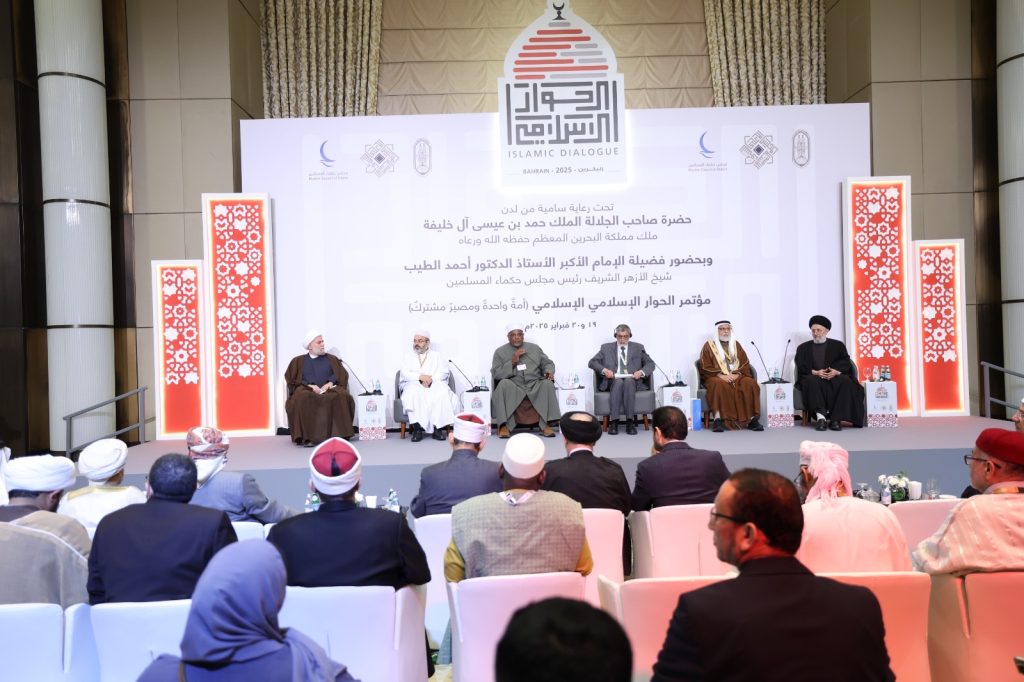In a special meeting held in the Kingdom of Bahrain, chaired by His Eminence the Grand Imam of Al-Azhar with the presence of numerous scholars and religious authorities…. Outcomes of the Intra-Islamic Dialogue Conference in Bahrain endorsed, including the ‘Call of the People of Qiblah’ charter aimed at fostering Islamic fraternity
In a special meeting held in the Kingdom of Bahrain, chaired by His Eminence the Grand Imam of Al-Azhar with the presence of numerous scholars and religious authorities….
Muslim Council of Elders hosts comprehensive Islamic scholarly summit
Scholars from various Islamic schools of thought unanimously reject displacement efforts aimed at undermining the Palestinian cause, affirming support for the Arab and Islamic position
From the Ummah’s scholars and wise dignitaries to the Arab leaders meeting at the upcoming Arab Summit in Egypt: We pray to God to bless your efforts and unify your word for the good of our Ummah
Tribute to the Palestinian people’s heroic resilience in defending their land and national identity against relentless aggression
Scholars emphasize that unity and focusing on commonalities are essential for mobilizing the Ummah’s capabilities to face challenges
Outcomes of the Intra-Islamic Dialogue Conference in Bahrain endorsed, including the ‘Call of the People of Qiblah’ charter aimed at fostering Islamic fraternity
Muslim Council of Elders establishes ‘Islamic Dialogue League’ with broad representation to oversee the recommendations’ implementation and support next year’s intra-Islamic dialogue conference in Egypt
Ummah’s scholars advocate for an ethical charter parallel to advancements in artificial intelligence technologies
Urgent call for Islamic institutions and scholars to harness artificial intelligence tools for effective engagement with youth and emerging generations
The Muslim Council of Elders held its eighteenth session in Manama, Bahrain, under the chairmanship of His Eminence Prof. Dr. Ahmed Al-Tayeb, Grand Imam of Al-Azhar and Chairman of the Muslim Council of Elders. This pioneering event was attended by council members and a distinguished assembly of scholars and religious figures from various Islamic schools of thought worldwide. The special meeting was convened to address issues of intra-Islamic dialogue amidst the current challenges facing the Ummah, with a particular focus on the Palestinian cause.
Participants unanimously rejected all displacement efforts aimed at obliterating the Palestinian issue and reiterated their support for the Arab and Islamic stance against such measures. They invoked blessings for the success of Arab leaders in the forthcoming Arab Summit in Egypt, hoping for unity in promoting the welfare of the Muslim Ummah.
The attendees praised the Palestinian people’s heroic resilience in maintaining their land and heritage in the face of severe aggression, which disregards the intrinsic value of land and national loyalty. They highlighted that unity and focusing on shared values are essential for harnessing the Ummah’s capabilities to tackle these challenges effectively.
Furthermore, the participants fully endorsed and supported the outcomes of the Intra-Islamic Dialogue Conference, including “The Call of the People of Qiblah” charter issued at this pivotal conference. This document provides the Muslim world with a detailed vision for the future of Islamic dialogue, outlining its priorities and pressing issues. It aims to foster Islamic fraternity across all community segments, fostering an environment of mutual understanding and respect, and halting all forms of derogatory speech, hate rhetoric, and takfir (accusations of disbelief).
In response to this call, the participating scholars decided to continue collective efforts in the field of Islamic dialogue. This includes implementing these visions through practical initiatives, notably forming a league for Islamic dialogue that includes representatives from all Islamic schools of thought. This league aims to follow up on the conference recommendations in consultation and coordination with partners from all Islamic schools of thought worldwide, affirming their full support for the upcoming Intra-Islamic Dialogue Conference to be held at Al-Azhar in the Arab Republic of Egypt next year.
The participants also discussed the pros and cons of artificial intelligence on the value and ethical system, emphasizing the necessity of an accompanying ethical charter to govern those managing these technological tools and guide users in optimally benefiting from them positively. They stressed the importance of Islamic institutions taking the initiative and scholars uniting efforts to leverage artificial intelligence tools, utilizing them to effectively communicate with the younger generations and youth, especially concerning accessing correct religious information and sound religious rulings.
The participants also discussed the pros and cons of artificial intelligence on the value and ethical system, emphasizing the necessity of an accompanying ethical charter to govern those managing these technological tools and guide users in optimally benefiting from them positively. They stressed the importance of Islamic institutions taking the initiative and scholars uniting efforts to leverage artificial intelligence tools, utilizing them to effectively communicate with the younger generations and youth, especially concerning accessing correct religious information and sound religious rulings.
The scholars, Islamic authorities, and thinkers at this meeting expressed their highest gratitude and appreciation to His Majesty King Hamad bin Isa Al Khalifa, King of Bahrain, for hosting the Intra-Islamic Dialogue Conference under his generous patronage and for his substantial support and care. They also thanked the Government of Bahrain for their warm reception and generous hospitality.
Furthermore, the attendees extended thanks to His Highness Sheikh Mohamed bin Zayed Al Nahyan, President of the United Arab Emirates, for his enduring support of the global efforts of the Muslim Council of Elders in promoting peace, enhancing Islamic fraternity, and fostering coexistence.










